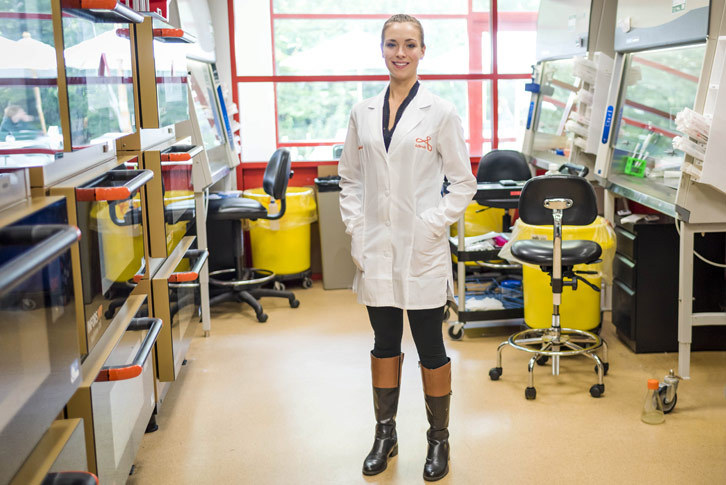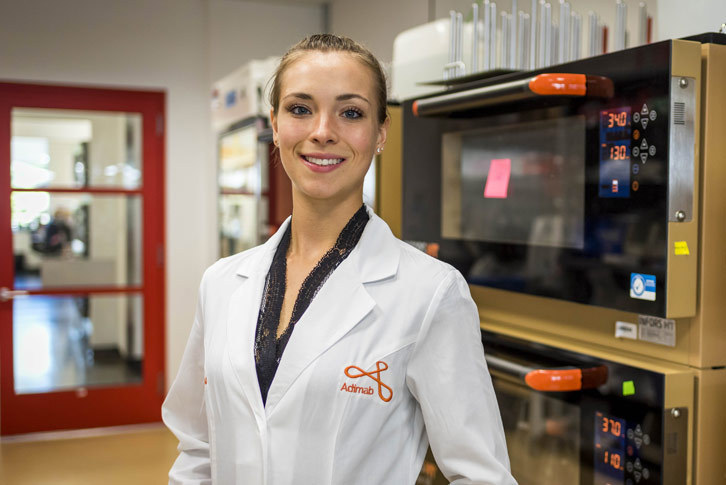When biology major Marina Good ’19 started working in a biosafety cabinet during her internship in the summer of 2018 with biotech company Adimab in Lebanon, N.H., she became acutely aware of how she moved. Cell culture requires sterile conditions, so Good put on gloves, sprayed her hands with ethanol and donned a lab coat before getting to the task at hand. She felt like a giant trying to maneuver around her surroundings the first time, but soon it felt natural.
“You use your hands differently,” Good said. “I’d pick things up with a couple fingers and hold it between other fingers to hold multiple things. Your dexterity increases.”
The way Good transferred cells in a pipette is similar to the way a painter might carefully place color on a canvas. It’s a good reminder that there’s an element of and creativity — in science.”

In fact, Adimab showed Good the creative potential of her discipline. The company uses yeast and mammalian cells to discover and produce antibodies that have the potential to cure a variety of diseases. Adimab didn’t invent the field of therapeutic antibodies, but it did invent novel procedures and technologies that make it a global leader in the industry.
“It’s a different mindset than working in research,” Good said. “It’s not just come to work and do your job. It’s come to work and be innovative — there’s a focus on discovery.”
Adimab has a library of more than 10 billion antibodies to draw on for the discovery of candidates that pharmaceutical companies then license to produce new drug therapies. While Good did not work directly on projects for Adimab’s partners, she helped prepare the cells used for campaign production. Her responsibilities included preparing the growth medium, expanding and banking cell lines, aliquoting cells, and performing quality control checks. She also reorganized Adimab’s liquid nitrogen tanks used to store cells and helped investigate a protocol for counting cells.

Good spent much of her internship gaining experience with procedures and equipment she had never used, but Colby-Sawyer set the foundation of her success. Good learned what she calls “lab common sense” at Colby-Sawyer and, as a first-year student, reached out to now-retired School of Arts & Sciences Professor Bill Thomas to get lab experience as early as possible. He connected her with two seniors, and she was a research assistant on their Capstone project. That work gave her a background in tissue culture, which impressed Adimab during her interview.
Good has also conducted research funded by the New Hampshire IDeA Network of Biomedical Research Excellence (NH-INBRE), a partnership between Colby-Sawyer and seven other colleges.
“NH-INBRE was what first taught me that Colby-Sawyer could help me go anywhere,” Good said. “Colby-Sawyer is a small school, and I liked it that way; I was able to take advantage of outside opportunities.”
That attitude led her to Adimab, where another Colby-Sawyer student had interned previously. It also led her to take courses at MDI Biological Laboratory and Shoals Marine Laboratory, where she learned that to answer many biomedical questions, one must work with people who have a variety of perspectives.
After her internship, Good accepted a part-time job with Adimab’s Molecular Core department, which then transitioned into a full-time role of Predoctoral Research Associate in Antibody Engineering. She plans to work in this role for the next two years before pursuing her Ph.D. in a biological field; currently she is interested in immunology, virology or genetics.
“You create your own opportunities,” Good said, speaking about how she hopes to have contributed to a culture of engaged learning at Colby-Sawyer. “If you want something, go for it.”
Good's internship was made possible in part thanks to a generous gift from the W. Jay Wilson Memorial Scholarship Fund.